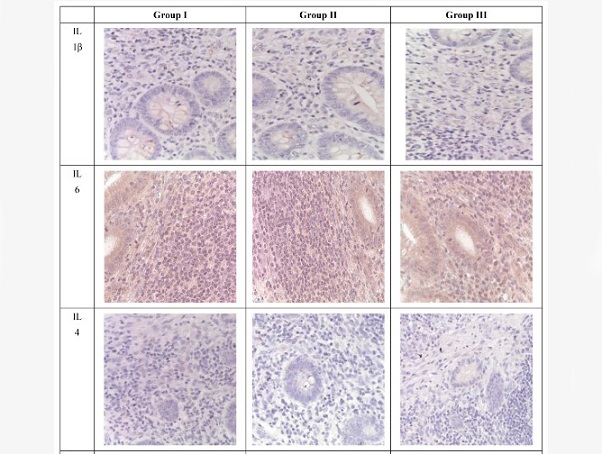BREAKING News! Study Alarmingly Finds That SARS-CoV-2 Is Causing Destructive Tissue Damage In The Appendixes Of Infected Children!
Nikhil Prasad Fact checked by:Thailand Medical News Team Jan 30, 2024 2 years, 5 hours, 59 minutes ago
COVID-19 News: In the relentless pursuit of understanding the multifaceted impacts of COVID-19, researchers from I.M. Sechenov First Moscow State Medical University, in collaboration with the Ministry of Health of Russia and Peoples’ Friendship University of Russia, have delved into a previously overlooked aspect: the influence of SARS-CoV-2 on the appendices of children. This groundbreaking study covered in this
COVID-19 News report aimed to provide a comprehensive understanding of the morphological and molecular biological changes in the appendixes of children across different age groups affected by COVID-19.
 Appendixes in children from the investigated groups. Immunohistochemical reactions with antibodies against IL-1β, IL-6, IL-4 counterstained with hematoxylin; magnification ×400. Expression in immunocompetent cells of the mucosal layer.
Background
Appendixes in children from the investigated groups. Immunohistochemical reactions with antibodies against IL-1β, IL-6, IL-4 counterstained with hematoxylin; magnification ×400. Expression in immunocompetent cells of the mucosal layer.
Background
The SARS-CoV-2 virus primarily enters the human body through the epithelium of the upper respiratory tract, causing a spectrum of clinical manifestations that affect various organ systems. Initially thought to spare children, subsequent studies revealed that they could contract the virus with mild or asymptomatic courses. Severe cases in children often manifest as Multisystem Inflammatory Syndrome in Children (MIS-C), a condition sharing similarities with inflammatory diseases such as toxic shock syndrome and Kawasaki disease.
Recent reports in the literature highlight cases of acute abdomen and appendicitis in children with positive SARS-CoV-2 results, adding a layer of complexity to the understanding of the virus's impact on pediatric patients. Recognizing the dearth of data on the potential invasion of SARS-CoV-2 in the appendix epithelium of children, the current study addresses this gap to unravel the intricacies of acute appendicitis development in the context of COVID-19.
Research Objectives and Tasks
The primary objective of this study is to conduct a morphological and molecular biological evaluation of the appendix in children with COVID-19, spanning different age groups. The specific tasks include a comparative morphological analysis, characterization of the inflammatory infiltrate, and an evaluation of the cytokine balance in the appendix tissues.
Detailed Results
Histological examinations of appendix samples from children with COVID-19 revealed patterns consistent with acute appendicitis, showcasing destructive forms such as phlegmonous–ulcerative and gangrenous appendicitis. The microscopic analysis unveiled a complex picture, including congested blood vessels, microthrombi, lymphocytic infiltration, and hyperplasia of lymphoid tissue, emphasizing the severity of the pathological changes induced by the virus.
Immunohistochemical studies provided further insights, demonstrating an increase in immunocompetent cells, including CD3+, CD4+, CD20+, CD138+, CD163+, and CD68+ cells. This surge in immunocompetent cells suggests a robust activation of both cellular and humoral local immunity in respons
e to SARS-CoV-2 infection.
Notably, pro-inflammatory cytokines (IL-1, IL-6) and anti-inflammatory cytokines (IL-4, IL-10) were elevated in the appendix tissues of children with COVID-19. The delicate balance between pro-inflammatory and anti-inflammatory responses showcased a shift towards inflammation, highlighting the intricate immunological response induced by SARS-CoV-2.
Research Discussion and Implications
The study delves into the intricate relationship between COVID-19 and appendicitis in children, uncovering morphological features and local immune responses. The observed upsurge in CD-positive cells indicates an activated immune response, possibly contributing to the severity of the appendicitis. Furthermore, the heightened expression of pro-inflammatory and anti-inflammatory cytokines suggests a nuanced and complex immunological landscape in the affected appendix tissues.
Confocal microscopy, a powerful imaging technique, revealed a positive signal of SARS-CoV-2 viral RNA in the appendix epithelium, suggesting a direct damaging effect on the organ. This finding emphasizes the tropism of SARS-CoV-2 to the appendix, with evidence of increased expression of ACE2 and Furin proteins, the receptors through which the virus gains entry into host cells.
Conclusion and Future Directions
In conclusion, the research findings sheds light on the complex interplay between COVID-19 and appendicitis in children. The morphological and molecular changes observed, along with the activation of both cellular and humoral local immunity, underscore the need for further exploration in this direction.
Understanding the intricate relationship between COVID-19 and appendicitis in children carries significant implications for clinical practice, particularly in the diagnosis and management of pediatric patients with the virus. The study's findings highlight the importance of considering the gastrointestinal impact of SARS-CoV-2, particularly in vulnerable populations such as children.
As the global scientific community continues to grapple with the ongoing pandemic, further research efforts are crucial to uncovering the full extent of COVID-19's impact on various organ systems. Ongoing investigations into the immunological responses and molecular pathways involved in COVID-19-associated appendicitis will contribute to a more comprehensive understanding of the virus's effects on pediatric patients, ultimately informing better clinical management strategies. The findings from this study open avenues for future research, inviting scientists and clinicians to delve deeper into the intricate relationship between COVID-19 and gastrointestinal complications in children.
The study findings were published in the peer reviewed journal: Biomedicines.
https://www.mdpi.com/2227-9059/12/2/312
For the latest
COVID-19 News keep on logging to Thailand Medical News.
